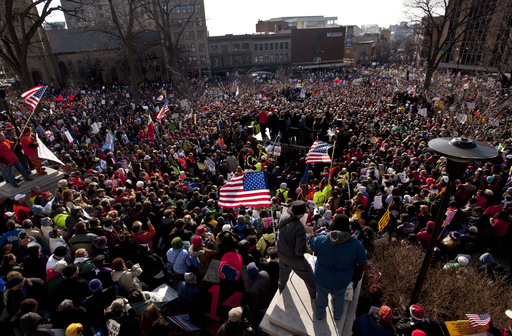
MADISON, Wis. — A significant legal decision was made on Monday in favor of public workers and teachers unions in Wisconsin, reinstating the collective bargaining rights that had been revoked under a 2011 state statute. This legislation had previously ignited intense protests across the state and positioned Wisconsin as a key battleground in the debate over union rights nationally.
The controversial law, known as Act 10, effectively stripped most public employees of their power to negotiate wage increases and other workplace issues. It also mandated higher contributions to health insurance and retirement plans.
Dane County Circuit Judge Jacob Frost ruled that all public sector workers who had lost their collective bargaining rights would have them reinstated to their status prior to the enactment of Act 10. This ruling specifically aligns public sector workers with police and firefighter unions, which were not subject to the same restrictions under the law.
It is anticipated that this ruling will face an appeal to the Wisconsin Supreme Court. The court is currently composed of a liberal majority, though an upcoming election in April could alter that balance for the next year.
Proponents of Act 10 argue that it gave local governments enhanced authority over personnel and enabled necessary cost-cutting measures. They claim that rolling back the law, which has allowed local entities to mitigate costs through increased employee contributions, could lead to financial ruin for schools and municipalities.
In contrast, Democratic critics assert that the law has negatively impacted schools and other public services by stripping employees of their capacity to negotiate for fair pay and favorable work conditions.
Act 10 was introduced by then-Governor Scott Walker and passed by a Republican-dominated Legislature, despite facing over a month of protests that filled the Capitol with up to 100,000 demonstrators. Although the law has weathered numerous legal challenges over the years, this current suit is the first since the liberal shift in the Wisconsin Supreme Court’s composition in 2023.
The lawsuit brought by seven unions and three union leaders contended that Act 10 should be invalidated due to its unconstitutional exemptions for firefighters and other public safety personnel. Attorneys representing the Legislature maintained that these exemptions are lawful and have been validated by past judicial decisions, urging the case to be dismissed.
Judge Frost ruled in July that the law breaches equal protection provisions embedded in the Wisconsin Constitution by categorizing public employees into “general” and “public safety” groups. He concluded that unions representing general employees, such as teachers, should not face different treatment compared to public safety unions that were excluded from the law’s ramifications.
In a detailed ruling, he outlined multiple specific components of the law that must be invalidated.
Wisconsin Assembly Speaker Robin Vos expressed eagerness to appeal the ruling. In a statement, he remarked, “This lawsuit is emerging more than ten years after Act 10 was passed and following many courts dismissing similar baseless legal challenges.”
The Wisconsin Manufacturers and Commerce, the predominant business lobbying organization in the state, criticized the ruling as well. WMC President Kurt Bauer stated, “Act 10 is not only constitutional, but it’s instrumental for policymakers and elected officials in balancing budgets and finding savings for taxpayers. Thanks to Act 10, we have preserved billions in budgetary resources, shielding Wisconsinites from substantial tax hikes over the past decade.”
In court filings, the Legislature’s defense indicated that the arguments presented in this case had previously been rejected by the state Supreme Court in 2014. They asserted that the only difference since that ruling is the current composition of the court.
Act 10 essentially eliminated collective bargaining for numerous public unions by limiting negotiations solely to base wage increases that do not surpass inflation rates. Additionally, the law prohibited automatic deductions for union dues, mandated yearly recertification votes for unions, and required public employees to increase their contributions toward health insurance and retirement benefits.
This legislation marked a defining moment in Walker’s career, who fended off a recall election and utilized his confrontations with unions as a campaign point during his unsuccessful presidential bid in 2016. Judge Frost, who issued Monday’s ruling, reportedly signed the petition to recall Walker. He did not withdraw from the case despite any potential conflicts, as no motions for his recusal were filed.
Since the implementation of Act 10, union membership in Wisconsin has seen a significant decline. According to an analysis by the nonpartisan Wisconsin Policy Forum, the state has experienced the most substantial drop in its unionized workforce since 2000.
In 2015, the Republican-majority Wisconsin Legislature enacted a right-to-work law that further curtailed private-sector unions’ influence.
The public sector unions involved in the lawsuit include the Abbotsford Education Association, the American Federation of State, County and Municipal Employees Locals 47 and 1215, the Beaver Dam Education Association, SEIU Wisconsin, the Teaching Assistants’ Association Local 3220, and the International Brotherhood of Teamsters Local 695.
